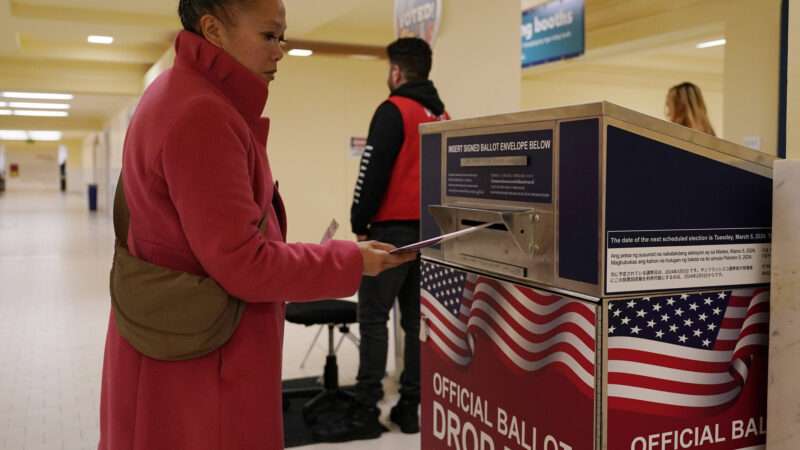
A funny thing happens when you leave abortion access up to each state: Voters start to show politicians how they actually feel. The loudest and most persistent voices are no longer the ones most able to influence policy. And—perhaps surprisingly to some—this has resulted in a wave of successful pro-choice ballot initiatives.
Since the Dobbs decision overturned Roe v. Wade, the abortion rights side has come out on top every time the matter has been up for a vote on state ballots (even in states such as Kansas, Ohio, and Kentucky).
It looks like the great protector of abortion access might be direct democracy.
Accordingly, activists across the country have been working to get reproductive freedom initiatives on fall 2024 ballots. And recently, they've seen some positive developments in several states, including Arizona, Colorado, Florida, and Montana—despite a lot of pushback from conservative authorities looking to thwart plans to put the matter directly to voters.
Who's Afraid of Direct Democracy?
Below, I'll get into what's going on in each of the four states I mentioned above. But first, I just want to bring up a couple of notable things about this whole process.
First: The push for voters to weigh in directly on abortion's legality is made possible by rules that allow voters to propose and collect signatures for ballot initiatives without first getting clearance from lawmakers. In places where lawmakers must start the initiative process, efforts to support or restrict abortion access keep being stymied.
"Wisconsin's legislative session ended without a state Senate vote on a measure that the House approved to ask voters to ban abortion after 14 weeks," notes the Associated Press. "A Louisiana measure to enshrine abortion rights in the state constitution died in committee and one in Maine effectively died when it fell short of receiving the approval of two-thirds of the House."
The second—and more important—thing to observe here how is hostile conservative authorities have been to the ballot process. They're clearly scared of letting people have a direct say in their states' abortion policies.
We've seen conservative authorities try to thwart pro-abortion ballot initiatives in indirect ways, such as in Ohio, where they tried to raise the threshold for passing a constitutional amendment in order to make it harder for a reproductive freedom amendment to pass. (The threshold-raising initiative failed, and the reproductive freedom amendment passed.)
More frequently, we see it in direct ways. Republican attorneys general have been trying to disqualify these amendments—as was the case in Florida and Montana—or take other steps to discourage them, such as using biased ballot language.
Florida's Proposed Amendment 4 Overcomes State Challenge
In Florida, a proposed constitutional amendment concerning abortion made it all the way to the state's Supreme Court, where the state argued that it was deceptive and would confuse voters if allowed onto the ballot. Some justices didn't appear too fond of the amendment's content, but they still rejected Attorney General Ashley Moody's narrative of the measures being a wolf in sheep's clothing. "This is a wolf coming as a wolf," said Chief Justice Carlos Muniz, "The people of Florida aren't stupid. They can figure it out."
In a 4–3 decision on April 1, the court approved the proposed amendment's appearance on the ballot.
If passed, the amendment will stipulate that "except as provided in Article X, Section 22, no law shall prohibit, penalize, delay, or restrict abortion before viability or when necessary to protect the patient's health, as determined by the patient's healthcare provider." (Article X, Section 22 relates to parental notification when a minor seeks an abortion.)
The state had argued, among other things, that the proposed law's title—"Amendment to Limit Government Interference with Abortion"—was misleading because the amendment would do more than just "limit" government interference. The court disagreed. "The proposed amendment does not eliminate the government's ability to 'interfere' with abortion in all circumstance," the court pointed out. "Its reference to article X, section 22 of the Florida Constitution—which grants the Legislature authority to require notification to a parent or guardian of a minor before termination of the minor's pregnancy—explicitly provides for an instance in which the legislative authority to 'interfere[] with' abortion will be preserved in the event the proposed amendment is passed. And the proposed amendment would not prohibit the Legislature from passing laws 'interfering' with abortion after the point of viability and when the mother's health is not in jeopardy."
Getting the measure passed will require a vote yes from 60 percent of those who vote.
Anna Hochkammer of the Florida Women's Freedom Coalition talked to Politico recently about what it will take to get there. "You get to 60 percent in Florida by being really focused about who you're talking to, how you're talking about abortion access and getting people to understand that it's an issue that transcends politics," she said. "You basically have to give people who are independents and Republicans permission to agree with you on this thing, to disagree with their individual candidate or their party, and to split that ticket if that's what they feel they need to do."
"I don't know whether the bottom is going to push the top, or the top is going to push the bottom, but I certainly think that more people feel positively about access to abortion than they do about any particular political candidate," Hochkammer said.
Montanans Securing Reproductive Rights Can Start Collecting Signatures
After some legal wrangling, abortion advocates in Montana have been cleared to start collecting signatures to get an abortion rights initiative on the state's November ballot.
The proposed amendment—Constitutional Initiative 128—is being sponsored by Montanans Securing Reproductive Rights (MSRR), a coalition that includes the state branches of the American Civil Liberties Union and Planned Parenthood Advocates. The amendment would state that "there is a right to make and carry out decisions about one's own pregnancy, including the right to abortion. This right shall not be denied or burdened unless justified by a compelling government interest achieved by the least restrictive means."
Most recently, the group was wrangling with the state over the proposed law's language. On April 4, the Montana Supreme Court ordered Secretary of State Christi Jacobsen to finalize the language, over objections from Jacobsen and Attorney General Austin Knudsen.
In March, the court overruled Knudsen's finding that the initiative was "legally insufficient." Knudsen is following what's quickly becoming tradition for GOP attorney generals in states where such initiatives are being circulated: to try to quash them by any means necessary.
Ironically, Knudsen's determination torpedoed a chance for Republican state lawmakers to officially express dismay over the proposal. "State law passed in recent years allows for a legislative review of proposed ballot initiatives after proposals are found to be 'legally sufficient' by the attorney general," reports the Montana Free Press. "That review allows a committee of lawmakers to vote on whether to support the proposal, a determination that is then attached to the petition circulated during signature gathering." But because Knudsen did not find it legally sufficient, lawmakers were not given that opportunity.
"MSRR has until June 21 to collect upwards of 60,000 verified signatures from registered voters across 40 state House districts and submit them to county election officials," adds the Free Press.
Arizona and Colorado
Arizona and Colorado have also seen momentum for abortion rights initiatives.
Even as Arizona's Supreme Court was deliberating on—and ultimately upholding—a Civil War–era law banning abortion, activists were working to put the matter of abortion rights up for a vote.
Arizona for Abortion Access—a coalition that, as in Montana, includes the state branches of the American Civil Liberties Union and Planned Parenthood Advocates—announced this month that they have gathered enough petition signatures to get their proposed amendment on the November ballot. As of April 2, the group had collected 506,892 signatures—well above the 383,923 threshold required and probably enough to seal the deal even if some signatures are thrown out.
The idea is to pass a constitutional amendment declaring that "every individual has a fundamental right to abortion" and "the state shall not enact, adopt, or enforce any law, regulation, policy or practice" that "denies, restricts, or interferes with that right before fetal viability unless justified by a compelling state interest that is achieved by the least restrictive means." The amendment would also stop the state from interfering with "an abortion after fetal viability that, in the good faith judgment of a treating health care professional, is necessary to protect the life or physical or mental health of the pregnant individual," and from penalizing anyone "for aiding or assisting a pregnant individual in exercising the individual's right to abortion."
The initiative may hold extra weight in the November elections in light of the state's now-total ban being allowed to be in effect. "I think it supercharges the ballot initiative and it supercharges the elections of all pro-choice candidates," Attorney General Kris Mayes—who has pledged not to prosecute abortion cases—told the Arizona Republic.
In Colorado, "Coloradans for Protecting Reproductive Freedom coalition announced it had secured more than 225,000 signatures, exceeding its goal of 185,000," notes The Hill. "The campaign needed 124,238 signatures to qualify."
That puts proposed Ballot Initiative 89 well on its way for a vote this fall, though the group still needs to collect some additional signatures to meet a requirement that signatures include 2 percent of registered voters in every Senate district.
The measure would amend the Colorado constitution to acknowledge "the right to abortion, and, in connection therewith, prohibiting the state and local governments from denying, impeding, or discriminating against the exercise of that right."
Colorado could face dueling initiatives if anti-abortion activists manage to get enough signatures. This measure—deemed Initiative 81—would ban abortion throughout pregnancy.
Abortion Initiatives Could Be on 7 Additional Ballots
At least two states have already secured a place for an abortion initiative on November's ballot. From the Associated Press:
MARYLAND
Maryland voters this year will also be asked whether to enshrine the right for women to end their pregnancies in the state's constitution in a ballot question put before them by lawmakers last year. The state already protects the right to abortion under state law and Democrats outnumber Republicans 2-1. Abortion is allowed in Maryland until viability.
NEW YORK
New York lawmakers agreed to ask voters to bar discrimination on the basis of pregnancy, pregnancy outcome and reproductive healthcare as part of a broader equal protection amendment. It would also bar discrimination on the basis of sex, sexual orientation, gender identity, national origin and disability. The language of the constitutional amendment does not mention abortion specifically. Abortion is allowed in New York law until viability.
Activists in a number of other states are still working on getting the issue to voters this fall. This includes Arkansas, Missouri, Nebraska, Nevada, and South Dakota. (Am I missing an abortion initiative in your state? Let me know! Write to sexandtech@reason.com.)
Today's Image

More Sex & Tech News
• On Friday, the House of Representatives passed the Reforming Intelligence and Securing America Act, which reauthorizes Section 702 of the Foreign Intelligence Surveillance Act (FISA). But a proposed amendment that would have required federal law enforcement agents to get a warrant before searching American communications failed.
• "Kentucky Gov. Andy Beshear signed a controversial bill requiring age verification for individuals seeking to use pornography websites," reports Reason's Emma Camp. "While the bill seeks to prevent minors from accessing explicit materials, the law will require a substantial invasion of adults' privacy."
• Foundation for Individual Rights and Expression president Greg Lukianoff reviews Jonathan Haidt's The Anxious Generation.
The post What Leaving Abortion Up to the States Really Means appeared first on Reason.com.







